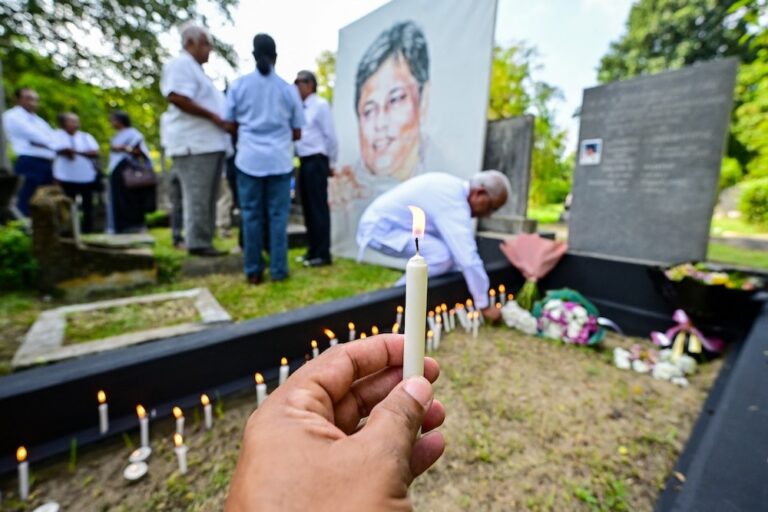(FMM/IFEX) – The following is a 19 October 2006 FMM press release: FMM decries bombing of the Voice of Tigers (VOT) The Free Media Movement (FMM) decries the bombing of radio station Voice of Tigers (VOT), the official radio station of the Liberation Tigers of Tamil Eelam (LTTE). Fighter jets belonging to the Sri Lankan […]
(FMM/IFEX) – The following is a 19 October 2006 FMM press release:
FMM decries bombing of the Voice of Tigers (VOT)
The Free Media Movement (FMM) decries the bombing of radio station Voice of Tigers (VOT), the official radio station of the Liberation Tigers of Tamil Eelam (LTTE). Fighter jets belonging to the Sri Lankan Air Force bombed the station in Killinochchi, an LTTE held town in Northern Sri Lanka on 17th October 2006. The attack destroyed broadcasting towers of the station and injured two workers.
The Media Centre for National Security (MCNS) of the government said that though the VOT radio tower was not directly targeted, it could have been damaged during air attacks on other LTTE targets.
It must be underscored that the FMM is extremely critical of LTTE’s regressive media policy stifling democratic voices within the areas held by them. For instance, on several occasions, the FMM condemned attacks on the Thinamurusu newspaper, a weekly published by the paramilitary / political party Eelam Peoples Democratic Party (EPDP) by suspected members of the LTTE.
At the same time, the FMM believes that media owned by the LTTE and non-state actors have an inviolable right to exist and broadcast, provided they do not take part directly in the war activities and, akin to Radio Mille Collines in Rwanda, do not engage in messages that exacerbate communal tensions and incite hatred.
While the FMM opposes violence and terrorism to achieve political objectives, it also recognizes that the role and the rights of rebel and non-state media institutions is a hotly contested issue in press freedom discourse.
While some believe that, in conflict situations, it is better to leave open the space for rebel media to promote their own messages, others feel that since such media often promote violence, they should be forcefully shut down. Still others say that a process of engagement with a view to long term transformation of such media is essential – a process grounded in dialogue and engagement, not violence. In counterpoint, some say that such dialogue is ultimately pointless.
The FMM believes that it is vital to recognize and strengthen this debate in Sri Lanka, so as to ensure a democratic dialogue in the polity and society before action is taken to target and militarily shut down rebel media. The use of violence against media, we feel, irrespective of whether it is initiated by the State or the LTTE, may only result in tit-for-tat violence that spirals out of control and endangers media freedoms and human security for all journalists in Sri Lanka.
Recognizing that the Sri Lankan State, defense forces, the LTTE and paramilitary groups all run their own media in print, electronic and in cyberspace, the FMM argues that a vibrant and democratic media landscape in Sri Lanka is founded upon a diversity of opinion.
Promoting a culture of tolerance and diversity in the media and decrying all attempts made to stifle the media through the use of violence, the FMM sincerely hopes that the bombing of VOT will not become a precedent for increased attacks against media institutions and journalists in Sri Lanka.


